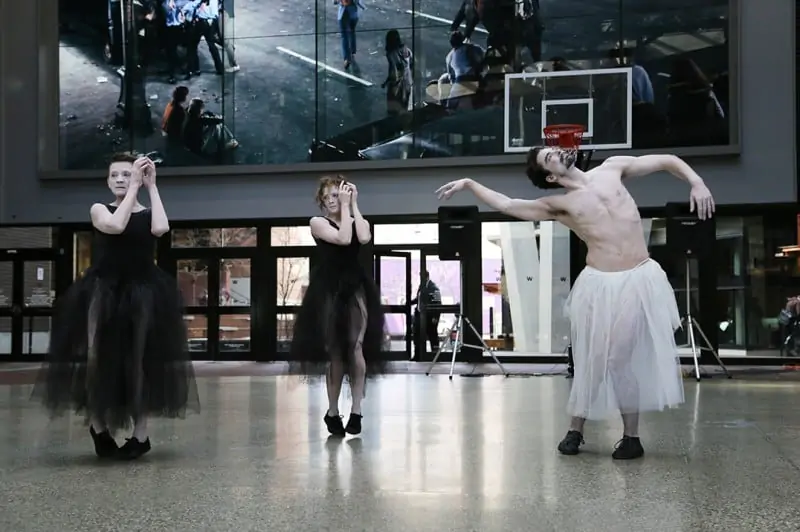The 39th Powell Street Festival starts TODAY! For two whole days Oppenheimer Park and surrounding areas will be a nexus of Japanese and Japanese Canadian music, dance, crafts, communities, and food! We’re proud to be featuring an incredible roster of creative talent, including the mind-blowing performers of Kokoro Dance, who will be performing today (Saturday, August 1st) at 5:00pm at the Diamond Stage in Oppenheimer Park. Last week, Jay Hirabayashi, co-founder of Kokoro, speaks with Powell Street Festival AD, Mark Takeshi McGregor, to shed more light on this audacious art form and give us a glimpse into their Saturday performance, Book of Love.
Q: Kokoro is respected throughout Canada as a dance organization committed to multi-disciplinary collaboration and cross-cultural exploration, but I would venture to say that one of its core influences is the striking Japanese dance form, butoh. What attracted you to butoh? Can you briefly describe it for those who might not be familiar with it?
A: Butoh originated from the work of Tatsumi Hijikata and Kazuo Ohno in the late 1950’s. They both had training in western modern dance but wanted to create movement that came from themselves rather than from someone else. Hijikata chose to emulate the movement he remembered from his childhood in Akita region of northern Japan. He developed a method of developing movement from imagery, codifying those movements by giving them descriptive names, and then having his dancers perform them as he recited them in a stream of consciousness flow. Ohno preferred to have his students not emulate his way of moving but to find their own original way of expressing themselves. He, himself, preferred to express his feminine side, not in the Kabuki onnagata way, but he usually danced in women’s clothing. Early Hijikata butoh expression was also heavily influenced by European writers such as Antonin Artaud and Jean Genet, and he deliberately created controversially shocking works that challenged societal mores. Our butoh expression has a bit of both the Ohno and Hijikata streams, but also reflects our own contemporary dance training.
Q: On August 1st, Kokoro will perform excerpts from your upcoming event, Book of Love. Can you tell us a little more about this piece? What can we expect?
A: The Book of Love can be considered as chapters in a non-narrative, never-ending book, that reflects our experiences with the emotion of love. It is not intended to be a definitive guide or an autobiographical story or dance version of Fifty Shades of Grey. We are working with composer Jeffrey Ryan who is writing a score for the Standing Wave Music Ensemble. We have also enlisted British artist Jonathan Baldock to make costumes and sets, and lighting will be designed by Gerald King with whom we have worked for over 30 years. What we will show at Saturday’s 5pm Powell Street Festival performance will be some of our movement research to different music sources and without the Jonathan’s costumes.
Q: Outside of your performance at Powell Street Festival, Kokoro Dance enjoys a very active season. What are some of your upcoming highlights?
We will be premiering Book of Love at the Roundhouse from November 25th to December 5th. Information will be posted soon on our website: https://kokoro.ca.
Q: I think one of the coolest things Kokoro does is your public performance on Wreck Beach – in part because it’s a performance opportunity open to anyone willing to commit to the time and effort. What inspired this annual event? Why Wreck Beach?
A: I moved to Vancouver in 1973 to go to grad school at UBC where I was studying Buddhist philosophy, or at least, I was supposed to be studying Buddhist philosophy. I spent a lot of time not studying lying on the beach. In 1996, Barbara and I decided to take our dancers down to the beach to create a performance. Butoh uses a lot of imagery from nature including water, air, mud, birds, and fish. Wreck Beach gives you that imagery first hand and to dance there gives your body memories that can be recalled later in the studio or on a stage. We found it so powerful that we decided to do it every year. This year was our twentieth editition.
Q: I’m finding that Powell Street Festival means lots of different things to different people. What is the appeal of the festival for you or a group like Kokoro?
A: Our first office was at 314 Powell Street which we knew was a place where Japanese Canadians had to register for the camps they were sent to during the war. My father’s family history was in the States but resonates with what happened here. The Powell Street Festival is for me a once a year chance to celebrate my Japanese ancestry and to share that celebration with the Japanese Canadian and DTES communities.
* * * *
Kokoro Dance presents excerpts from “The Book of Love” at the 39th Powell Street Festival on Saturday, August 1st at 5:00pm at the Diamond Stage at Oppenheimer Park. This event is FREE.


